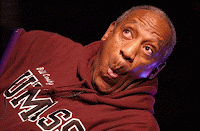Bill Cosby Doesn’t Know My Mama, Just Racial Stereotypes of Low and Moderate Income Black People

Thematically, the book is a literary extension of his “call-out sessions.” For the last 3 years or so, Cosby has traveled around the country calling black people (well, poor black people) out about their so-called pathological behaviors (having babies out of wed-lock, giving their children African names they can’t pronounce, calling each other Nigga, talking loud in public places, dropping out of school, being illiterate, buying rap music, wearing baggy pants, not speaking right, and so on).
The recent hoopla about Cosby’s book made me think about a piece I wrote that appeared in the Hartford Courant on July 15, 2004, shortly after Cosby had visited Springfield, Mass., near the beginning of his call-out tour. As you can tell from the piece, I think Cosby’s moral crusade is problematic for a number of reasons.
I reprint this piece without permission from the Courant. Hopefully they will not come and get me.
Bill Cosby Forgets the Obstacles
As a black man, I’m so angry at Bill Cosby that I could spit. Not because he has aired my people’s dirty laundry. Social scientists, beginning with W.E.B. Du Bois in his seminal work, “The
Cosby made me angry because he insulted my mama. You see, my mother was one of those welfare-dependent singly parents whom Cosby and others are so fond of kicking around.
After I read about his July 9 [2004] visit to
On the one hand, Cosby is right that too many black youths drop out of high school, that too many young girls get pregnant, that there is too much illiteracy and violence in black communities.
But he talks as if poor black people were simply immoral and irresponsible. What impact does the economic situation in cities have on these problems? What about the way young people are inundated daily with images of violence, sex, materialism and consumerism? Surely this matters.
My mama thinks so, too.
She got right to the point: “People who make it out like Cosby forget just how hard it is to live when you are poor.”
It was around 10:30 p.m., but I could tell that Mama was revved up. It was time to close my mouth, sit back, and listen.
Being poor is so hard, she point out. It is so easy to get frustrated, to want to give up. This is why so many people, she thinks, turn to drugs and alcohol. They are trying to escape. But it only makes things worse.
She believes that millionaires like Cosby forget how hard it is to work every day only to collect a paycheck that barely allows you to make ends meet.
She could not understand why he would complain about poor people who live above their means but not criticize middle-class people saddled with tons of credit-card debt.
She reminded me that even as we were talking, thousands of black kids were going to bed hungry, not because their parents are irresponsible, but because “people run out of money.”
Preach! Preach, Mama! I thought.
“It’s so hard to find decent housing,” she said. Moreover, the housing that is now being built in many cities, she complained, is not for poor black people, but is designed to lure rich white people back to the city. “I can’t afford any of that mess.”
She agreed with Cosby that there are lot of young men and women who do not work, but then asked, “What are they supposed to do?” There are no jobs in these cities, because they all followed the white folks to the suburbs.
“When I got to Detroit in the 1950s, even a high school dropout could get a job in construction or at an automobile plant and be able to afford a house and send their kids to college,” she said. “You can’t do that today.”
I could not keep silent any longer. “Tell it! Tell it like it is, Mama!”
Although she applauded Cosby’s philanthropy, she thinks that it is only a drop in the bucket. “What about the majority of kids who do not go to college or the ones who are not college material? Who will pay for their job training?”
She continued: “I do not understand why white folks are willing to spend billions of dollars building housing and schools in
She was particularly mad that so many young black men and women were in the military fighting Bush’s war. She believes that many of them enlist simply because there are so few economic opportunities in the communities that they come from.
I thought, Amen, Mama! Amen!
We continued to talk well past midnight, about the meaning of life, about the future of black people, about why she does not have a daughter-in-law yet.
When we finished, I told my mama I loved her. She said she loved me, too. After that, we said goodbye.
I was not as angry at Bill Cosby after I got off the phone. I realized that he doesn’t know my mama like I do.
Thanks Mama. I still love you!


Comments